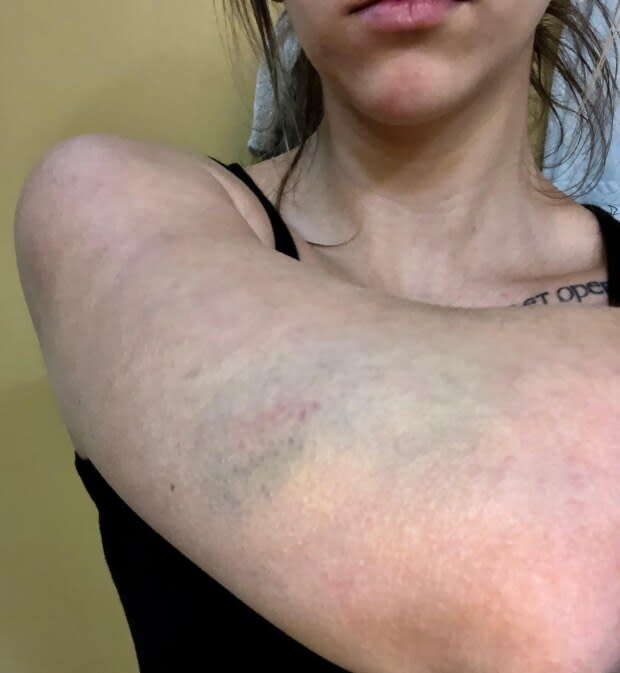House arrest, counselling for man with history of domestic assault
A man who turned himself in to police after his former girlfriend spoke publicly about intimate partner violence has been sentenced to house arrest and time served, and will be required to undergo counselling again.
Ashton Kennedy, 26, appeared via telephone from Her Majesty's Penitentiary for his sentencing hearing Monday afternoon in provincial court.
He pleaded guilty to one count of breaching an undertaking for failing to report to his bail supervisor. Three other charges of breaching an undertaking were withdrawn by the Crown. Kennedy was also sentenced for an assault on Melissa Gulliver, to which he had already pleaded guilty.
Kennedy had evaded a warrant for his arrest for more than 10 months until a CBC story led to Kennedy turning himself in to police.
"He had wanted to turn himself in for a long time, he was nervous, looking over his shoulder.… He was nervous to go to jail as he had never been," said defence attorney Jon Noonan.
"This [CBC] story really triggered him and he turned himself in the morning."

Kennedy admitted in court last summer to slapping Melissa Gulliver in the face the previous December, breaking a lamp, punching a hole in the wall, pushing her down on a bed, and slapping her again.
He opted to go through family violence intervention court, which focuses on rehabilitation rather than incarceration.
Shortly after he admitted his guilt, Kennedy fell off the map. He stopped checking in with his bail supervisor and failed to show up for any of the eight-week counselling sessions at the John Howard Society.
Kennedy had already gone through the court once, after he pleaded guilty to assaulting another former domestic partner prior to his relationship with Gulliver.
"Of concern is that Mr. Kennedy had completed the programming, had positive results, then committed another offence less than eight months later," said prosecutor Jacqueline McMillan.
"That demonstrates that he did not use the tools that he learned."
Lawyers agree on more counselling
McMillan said Gulliver has told the court in a victim impact statement that she has suffered physically, emotionally and financially.
Gulliver reported that her work suffered and had to stop attending classes at Memorial University because the assault left her feeling unfocused.
"She stated that she finds herself in survival mode and is in constant fear with her guard up," McMillan said.
Kennedy turned himself in to the Royal Newfoundland Constabulary on May 14, one day after Gulliver spoke to CBC about what had happened to her.
"I can actually life, I can breathe, I can live without being in survival mode," Gulliver said after Kennedy's arrest.

Noonan said his client is still young and has steady employment.
"He basically got in a dark place last June and July and got involved in some drug use. He failed to report to counselling and he basically just absconded," Noonan said.
"He didn't know how to deal with it, he didn't want to deal with it, he was afraid he would go to jail."
Noonan said Kennedy still wants treatment and said going to HMP was "an eye-opener."
"He had a slip-up and unfortunately in a domestic violence situation they are dangerous and not fair to Ms. Gulliver, the victim," he said.
"He acknowledges the impact upon her, he is remorseful, he accepts full responsibility and wants to be better."
Pointing to his admitted cocaine and alcohol use the night Kennedy assaulted Gulliver, Noonan said his client is able to have a non-violent relationship without drugs and alcohol at play.
"It's not like every relationship ends up in a domestic violence situation," Noonan said, adding Kennedy is currently in a new relationship where there has been no reported incidents.
Noonan told the court Kennedy grew up with an alcoholic mother and was sexually abused as a young teenager.
Having remained in custody since his arrest, Kennedy had 28 days' credit for time served.
House arrest, firearms ban
McMillan and Noonan agreed on a 60-day conditional sentence to be served at home, with exceptions made for work, one hour a day for exercise, and three hours per week for errands, and Chief Justice Pamela Goulding accepted the joint submission.
Noting his history of domestic abuse, Goulding also placed Kennedy on a five-year firearms ban.
He will remain on supervised probation for one year after his sentence is finished, and will continue to attend counselling throughout that time.
Read more from CBC Newfoundland and Labrador


